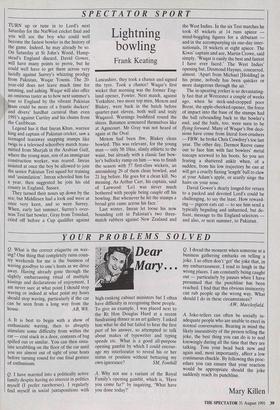YOUR PROBLEMS SOLVED
Q. What is the correct etiquette on wav- ing? One thing that completely ruins coun- try weekends for me is the business of waving goodbye to one's hosts as we drive away. Having already gone through the slightly embarrassing ritual of multiple kissings and declarations of enjoyment, I am never sure at what point I should stop waving or indeed at what point my hosts should stop waving, particularly if the car can be seen from a long way from the house. AB, W8.
A. It is best to begin with a show of enthusiastic waving, then to abruptly stimulate some difficulty from within the car — coat stuck in a door, contents of bag spilled out or similar. You can then simu- late scrabbling on the floor of the car until you are almost out of sight of your hosts before turning round for one final gesture of enthusiasm.
Q. 1 have married into a politically active family despite having no interest in politics myself (I prefer racehorses). I regularly find myself in social juxtapositions with
Dear
Mary. . .
high-ranking cabinet ministers but I often have difficulty in recognising these people. To give an example, I was placed next to the Rt Hon Douglas Hurd at a recent fundraising dinner in an art gallery. I asked him what he did but failed to hear the first part of his answer, so attempted to talk about makes of typewriter and typing speeds etc. What is a good all-purpose opening gambit by which I could encour- age my interlocutor to reveal his or her status or position without betraying my own ignorance? SM, Fonthill A. Why not use a variant of the Royal Family's opening gambit, which is, 'Have you come far?' by inquiring, 'What have you done today?' Q. I dread the moment when someone at a business gathering embarks on telling a joke. I so often don't 'get' the joke that, in my embarrassment, I tend to laugh in the wrong places. I am constantly being caught out — particularly by pauses when I have presumed that the punchline has been reached. I find that this obvious insincerity can rub people up the wrong way. What should I do in these circumstances?
AW, Macclesfield.
A. Joke-tellers can often be socially in- adequate people who are unable to excel in normal conversation. Bearing in mind the likely insensitivity of the person telling the joke, the best thing you can do is to nod knowingly during all the time that they are talking. Toss your head back now and again and, most importantly, affect a low continuous chuckle. By following this proc- edure you can ensure that your reaction would be appropriate should the joke suddenly reach its punchline.
Mary Killen










































 Previous page
Previous page